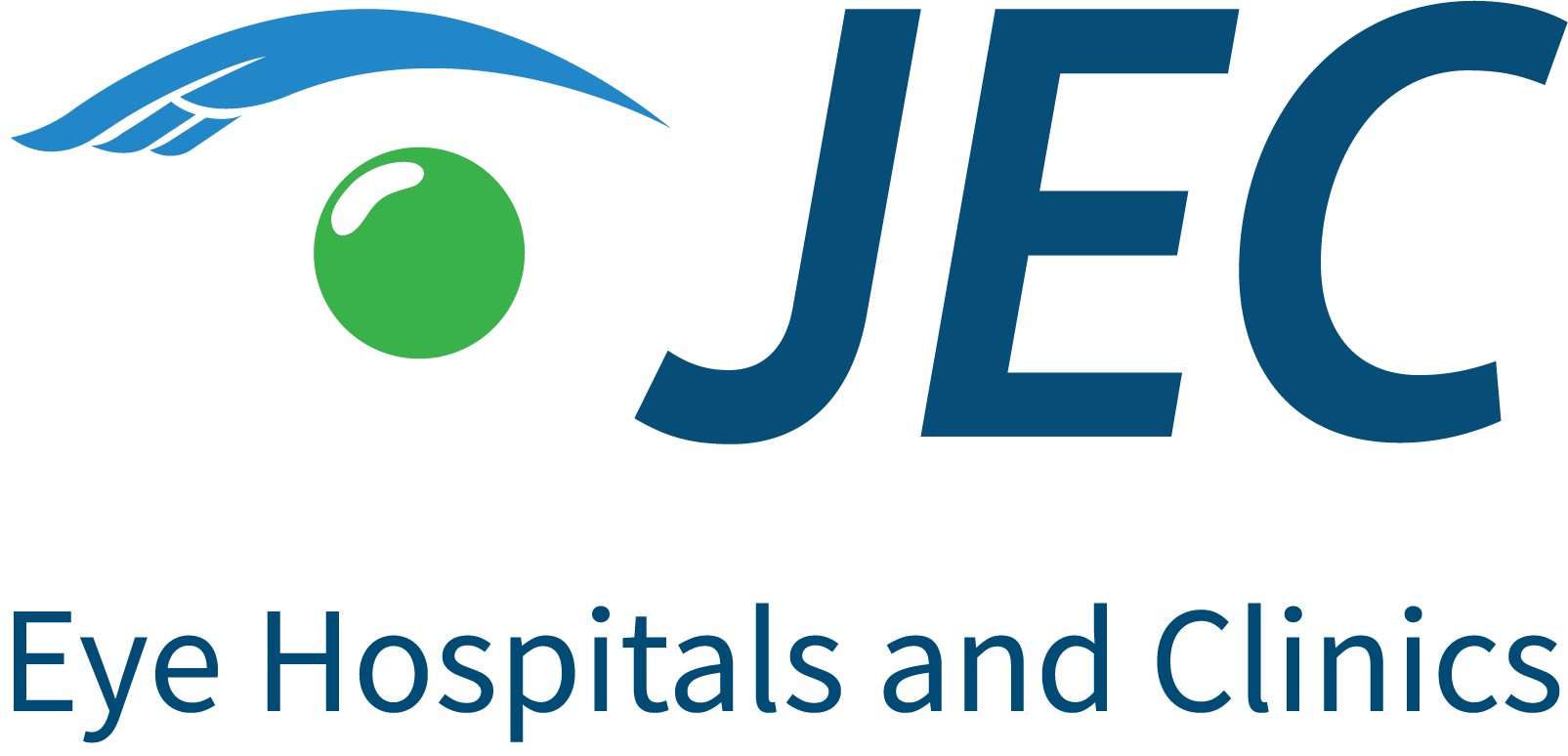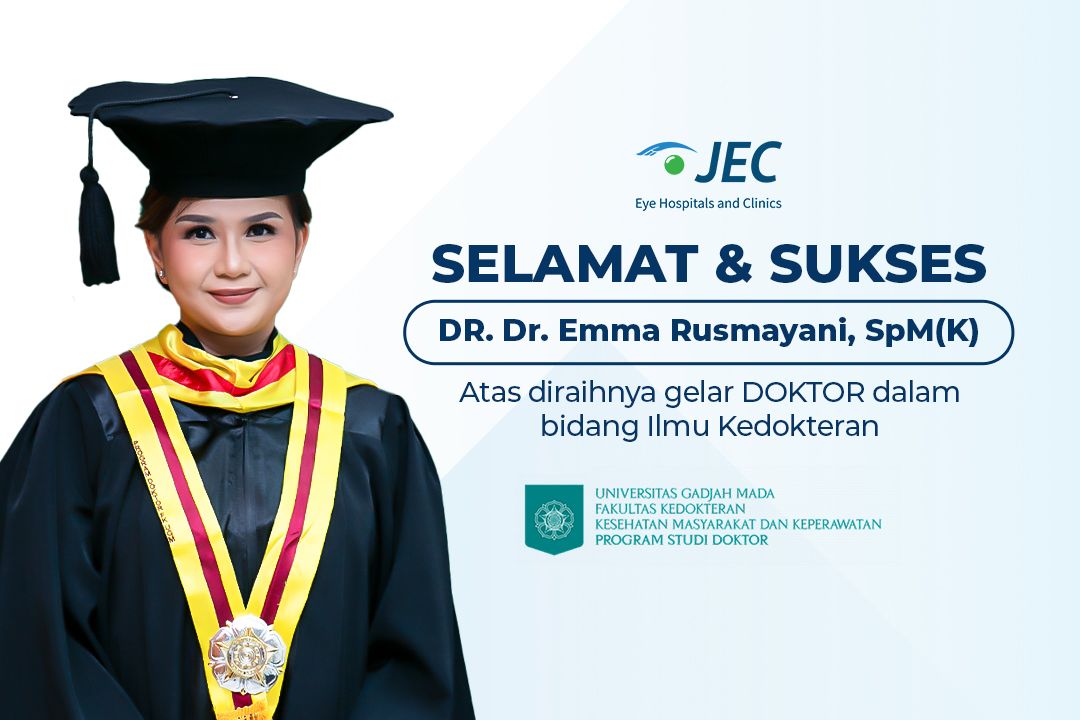Early Glaucoma Detection
Ischemia Modified Albumin (IMA) in Aqueous Humor
- Data from WHO states that glaucoma is the leading cause of irreversible blindness.
- Early Glaucoma Detection by IMA procedure can be done very easily and at an affordable price.
- Eye specialist from JEC Eye Hospital and Clinics, DR. Dr. Emma Rusmayani, SpM(K), initiated the research "Review of Ischemia-Modified Albumin, Tumor Necrosis Factor Alpha, and Malondialdehyde levels in aqueous humor and blood serum as markers of local and systemic ischemia in primary glaucoma"; led her to get a doctorate from Gadjah Mada University
Jakarta, 20 September 2022 – Glaucoma is one of the most common causes of blindness worldwide. Glaucoma poses a significant public health problem driven by the increasing age of the population. Patients need continuous treatment to prevent disease progression. Early detection is very crucial, especially for individuals with risk factors. If not detected early, glaucoma has the potential to result in a reduced area of vision and end in permanent blindness.
According to data quoted from WHO states that glaucoma is the main cause of irreversible blindness. The number of people with it is predicted to reach 76 million worldwide. Individuals with glaucoma should have their eyes checked regularly. The majority of glaucoma is asymptomatic so it is very possible that patients are not aware of the decline in their visual function. Early detection plays an important role in preventing disease progression. Keep in mind, eye nerve damage due to glaucoma cannot be cured and blindness from this disease lasts permanently.
The diagnosis of glaucoma is confirmed by examining the eye pressure (intraocular) by examining the area of vision (Humphrey visual field) and the thickness of the retinal nerve fiber layer (RNFL) or commonly called the retinal nerve fiber layer, through optical coherence tomography (OCT). Currently, early detection of glaucoma is mainly done through thinning of the RNFL on OCT examination. This check needs to be done serially and not just once to find out the damage to the RNFL that has occurred.
Understanding this situation, DR. Dr. Emma Rusmayani, Sp.M(K) provides an alternative for early detection of glaucoma through the biological marker of Ischemia Modified Albumin (IMA). This examination is a test for biological markers of ischemia (lack of blood flow to certain organs of the body) which is commonly used in the diagnosis of cardiovascular disease or other systemic diseases. Pathogenesis (disease development process) that occurs in glaucoma, one of which is a chronic ischemia process. Examination of IMA levels of aqueous humor aims to describe the damage that occurs due to the ischemia process. This examination is expected to be an alternative for early detection of glaucoma compared to existing examination methods.
DR. Dr. Emma Rusmayani, Sp.M(K) through her findings, provides solutions in the treatment of glaucoma through early detection with simple methods and relatively more affordable prices. Examination of biological markers of AMI by taking samples of intraocular aqueous humor that is not affected by systemic confounders. This research is contained in the dissertation "Review of Ischemia-Modified Albumin, Tumor Necrosis Alpha, and Malondialdehyde Levels in Aqueous Humor and Blood Serum as a Marker of Local and Systemic Ischemia in Primary Glaucoma". This study took place April 2021-June 2021 and involved 74 subjects.
“This study aims to provide a solution for individuals with glaucoma and people with risk factors to be able to detect the disease early. The sample is taken not through blood, but by taking the aqueous humor in the eye. In the fluid, if you see a high IMA result, it can be concluded that an ischemia and RNFL depletion process has occurred, which is an alarming sign of glaucoma patients,” explained DR. Dr. Emma Rusmayani, SpM(K).
“This IMA procedure can be done with an easy tap water and can be done at the polyclinic. With an easy process and a fairly affordable price, this technique can detect early glaucoma symptom to prevent blindness, "said DR. Dr. Emma Rusmayani, SpM(K).
Presentation of research results in a rational, systematic and empirical manner at the Open Examination, Doctoral Program in Medical and Health Sciences, Faculty of Medicine, Public Health and Nursing, Gadjah Mada University, Yogyakarta, which took place today, led Dr. dr. Emma Rusmayani, SpM(K) to achieve Doctorate degree.
JEC Eye Hospitals and Clinics continues to encourage JEC doctor to improve their capabilities. Not only for academic achievement, but the most important thing is to improve the quality of JEC services to patients, and contribute to providing solutions in the world of eye health in the country. Currently, JEC Eye Hospitals and Clinics already has a line of competent doctor in their fields consisting of dozens of doctors, 18 doctors and also 4 eye professors.
“The concern for the prevention of visual impairment in Indonesian society is one of the reasons for JEC Eye Hospitals and Clinics as an eye care leader that always provides the latest technology and comprehensive services. Health practitioners at JEC also often apply science-based findings, in order to provide solutions to the challenges facing society. Together with qualified practitioners, such as DR. Dr. "Emma Rusmayani, SpM(K) earned a Doctorate degree, JEC is optimistic that able to continue the contribution to the world of eye health in Indonesia," said Mubadiyah, S.Psi, MM as Head of Marcomm Division of JEC Eye Hospitals and Clinics.
·



 INA
INA